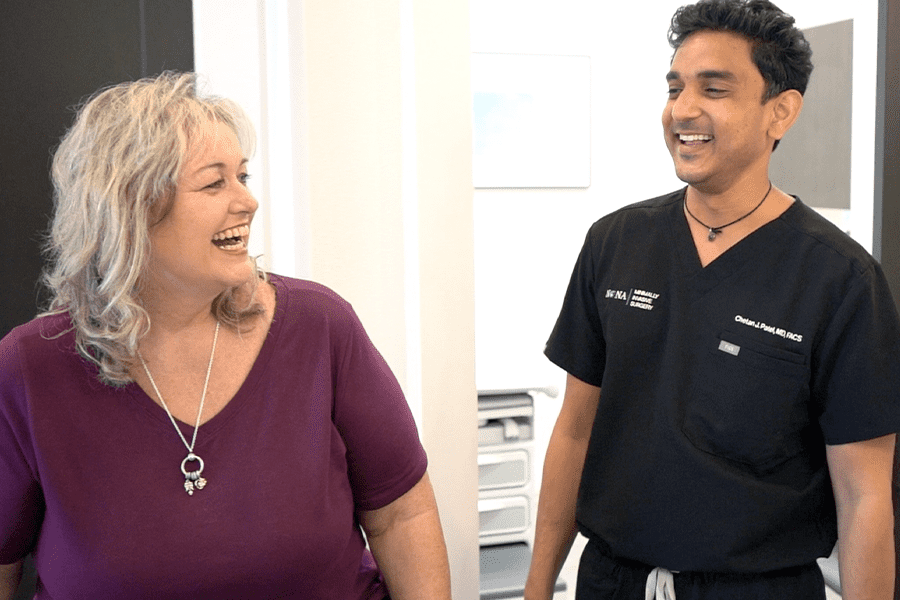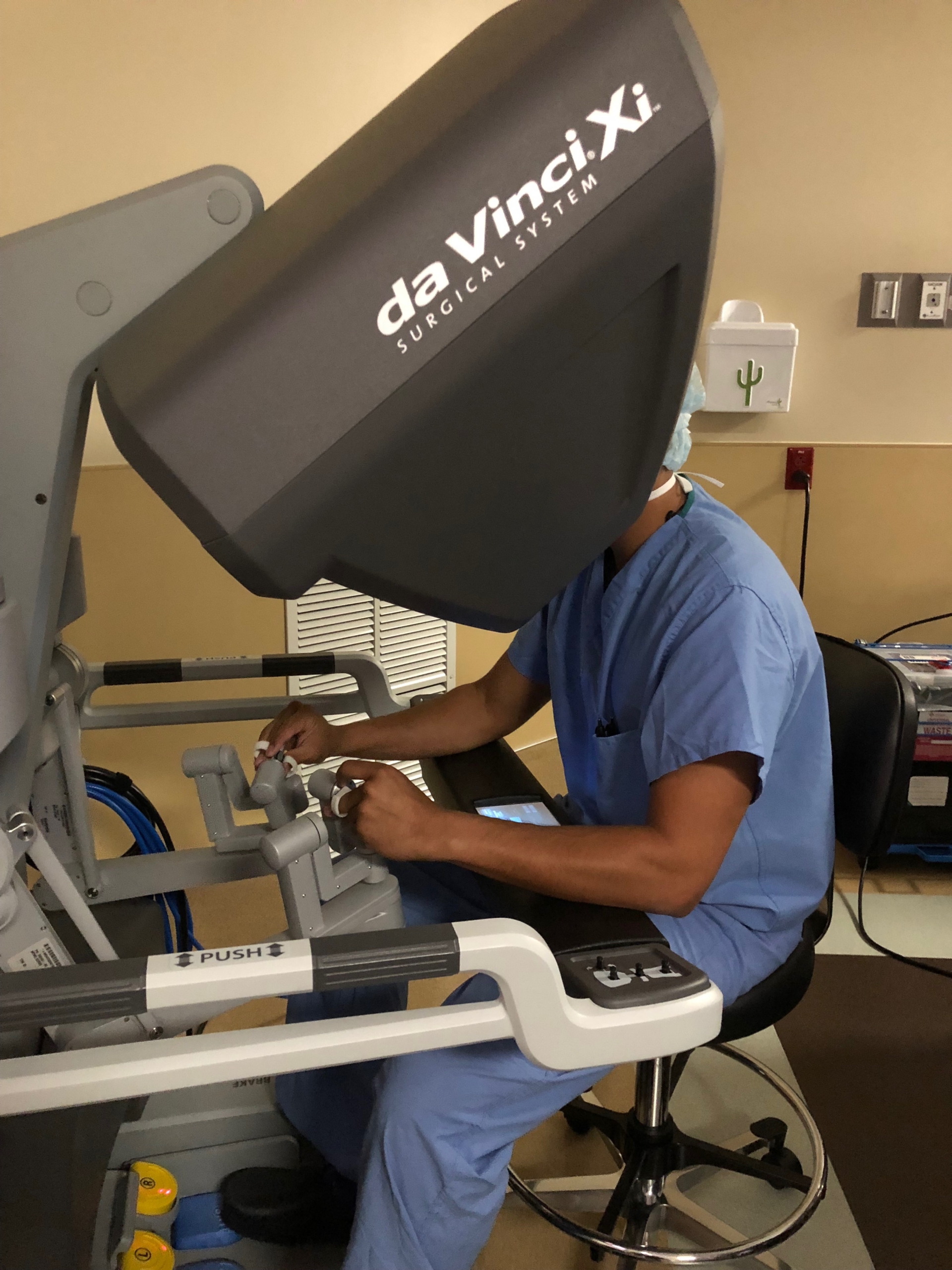- What is bariatric surgery?
- What are the different types of bariatric surgeries?
- What’s it like to recover from a gastric bypass?
- Why should I consider gastric bypass?
A gastric bypass is a type of bariatric surgery used to help patients lose weight. Doctors perform roughly 113,000 of these life-saving surgeries each year in the U.S.
Cindy, a patient of Chetan J. Patel, MD, FACS, a board-certified general surgeon and fellowship trained in bariatric surgery, received gastric bypass surgery and ended up losing 65 pounds in the first three months after her procedure. Now, Cindy says, “I feel wonderful.”
What Is Bariatric Surgery?
 Bariatric surgery is a set of procedures that alter the body’s digestive system to help patients lose weight. Gastric bypass is one of these surgeries. For many people, bariatric surgery can be life-altering and–in some cases–lifesaving. Bariatric procedures like gastric bypass are also used in conjunction with non-surgical weight-loss strategies, including:
Bariatric surgery is a set of procedures that alter the body’s digestive system to help patients lose weight. Gastric bypass is one of these surgeries. For many people, bariatric surgery can be life-altering and–in some cases–lifesaving. Bariatric procedures like gastric bypass are also used in conjunction with non-surgical weight-loss strategies, including:
- Behavior modifications that help patients manage their attitudes, behaviors, and thoughts around weight and food consumption
- Exercise to help patients burn calories faster
- Nutrition plans that reduce calorie intake (while still meeting dietary needs)
If these non-surgical weight-loss strategies are ineffective, your doctor may recommend gastric bypass as the solution. For most patients, losing 5% to 10% of their weight can significantly lower their risk of obesity-related health issues. The results of gastric bypass can be dramatic and impact every part of their life.
Cindy says, “One of the many benefits of gastric bypass surgery is that my body doesn’t hurt anymore. My legs don’t hurt. My knees don’t hurt. I’m feeling so healthy.”
What Are the Different Types of Bariatric Surgeries?
 Dr. Patel and the team at Orlando Minimally Invasive Surgery perform two primary types of life-changing bariatric surgeries for patients like Cindy:
Dr. Patel and the team at Orlando Minimally Invasive Surgery perform two primary types of life-changing bariatric surgeries for patients like Cindy:
- Gastric Bypass
- Sleeve Gastrectomy
- Duodenal Switch
- Revision Bariatric Surgery
Gastric Bypass is one of the earliest and most reliable bariatric surgeries and has been successfully used for more than 20 years. During the procedure, the surgeon makes an incision in the stomach to form a pouch that reroutes to the small intestine, allowing food to bypass the stomach. The technique limits the amount of food the stomach ingests, decreasing the number of calories absorbed during a meal.
Sleeve gastrectomy is a newer, innovative surgery that removes 80% of the stomach and staples the remaining portion together. Like a gastric bypass, this procedure limits the amount of food and calories a patient consumes.
On top of these, people often ask Dr. Patel and his team to perform revisional surgery, which is a secondary procedure after a patient has undergone a bariatric operation.
Dr. Patel performs these surgeries using minimally invasive robotic techniques to speed up the recovery process and reduce the risk of complications.
Choosing the right doctor for your bariatric surgery is critical. Cindy says, “Dr. Patel was so amazing. He takes time with you to answer all your questions. He took a lot of time with me to explain the procedure. All my concerns were answered.”
What Is It Like to Recover From a Gastric Bypass?
 Patients who undergo a gastric bypass may spend a day or two in the hospital to recover. In the weeks that follow, patients may experience some post-surgical pain, flatulence, fatigue, or other symptoms. Your doctor will assist you throughout this process and provide you with the tools and strategies to cope with any symptoms you experience.
Patients who undergo a gastric bypass may spend a day or two in the hospital to recover. In the weeks that follow, patients may experience some post-surgical pain, flatulence, fatigue, or other symptoms. Your doctor will assist you throughout this process and provide you with the tools and strategies to cope with any symptoms you experience.
Cindy is pleased with her surgery and says, “I healed very well. It was all very smooth.” At Orlando Minimally Invasive Surgery, the doctors devoted an entire team of specialists to provide for Cindy’s care. She says, “Although Dr. Patel helped me through it, I also had a dietician that he uses. She helped me through the different phases of starting to eat different foods. That’s been really wonderful, too.”
Dietary changes, exercise, and bariatric surgery form a three-pronged approach that can help patients return to health. For Cindy, the changes have been dramatic. She says, “I’m actually running and playing with my grandkids. I’m able to do a lot of things with them. We go to the park, we take the dogs out, we walk a lot. I haven’t been able to do that in a long time.”
Why Should I Consider Gastric Bypass?
It can be frustrating to struggle with weight-related issues. People who have difficulty managing their weight often turn to gastric bypass when other tactics fail to get them the results they want. For many patients, health concerns lead them to clinicians like Dr. Patel. However, health isn’t the only reason people contact bariatric surgeons. Many patients struggling with weight loss mention their declining self-esteem and emotional health as two significant factors that lead them to bariatric surgery.

The Centers for Disease Control and Prevention (CDC) says, “Obesity is serious because it is associated with poorer mental health outcomes and a reduced quality of life.” Some of the complications that stem from obesity include:
- Anxiety
- Cancer
- Chronic Pain
- Coronary Heart Disease
- Death
- Depression
- Gallbladder Disease
- High Blood Pressure
- High Cholesterol
- Osteoarthritis
- Sleep Apnea
- Stroke
- Type-2 Diabetes
If you’re experiencing ill-health related to your weight gain, gastric bypass offers an effective solution that can better your health, improve your outlook, and extend your life.
Since Cindy had the gastric bypass procedure with Dr. Patel, she says, “I’m off all medications. No more blood pressure medicine. My cholesterol is great.” Gastric bypass changed her life in so many positive ways. She says, “Dr. Patel is not just my surgeon. He’s also become a friend.”
Want to start your journey to weight loss? At Orlando Minimally Invasive Surgery, we’re here to make that happen. Call us at 407-605-3777 to find out how bariatric surgery may be able to help you.
